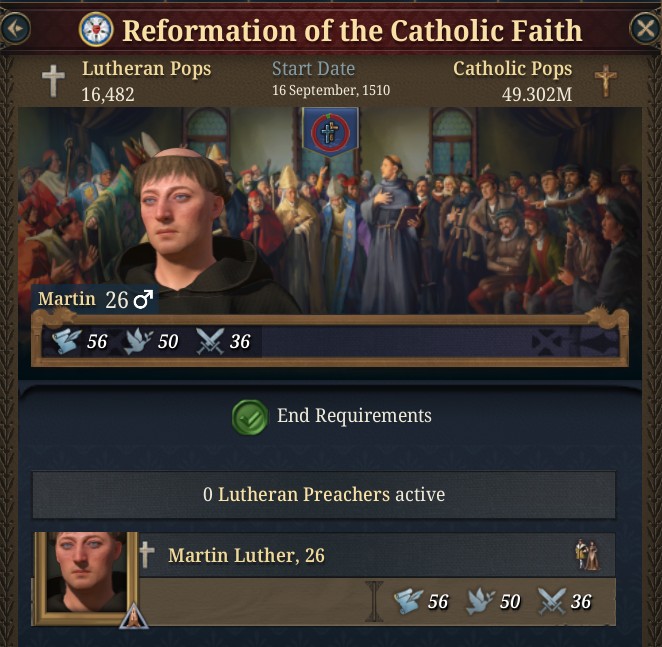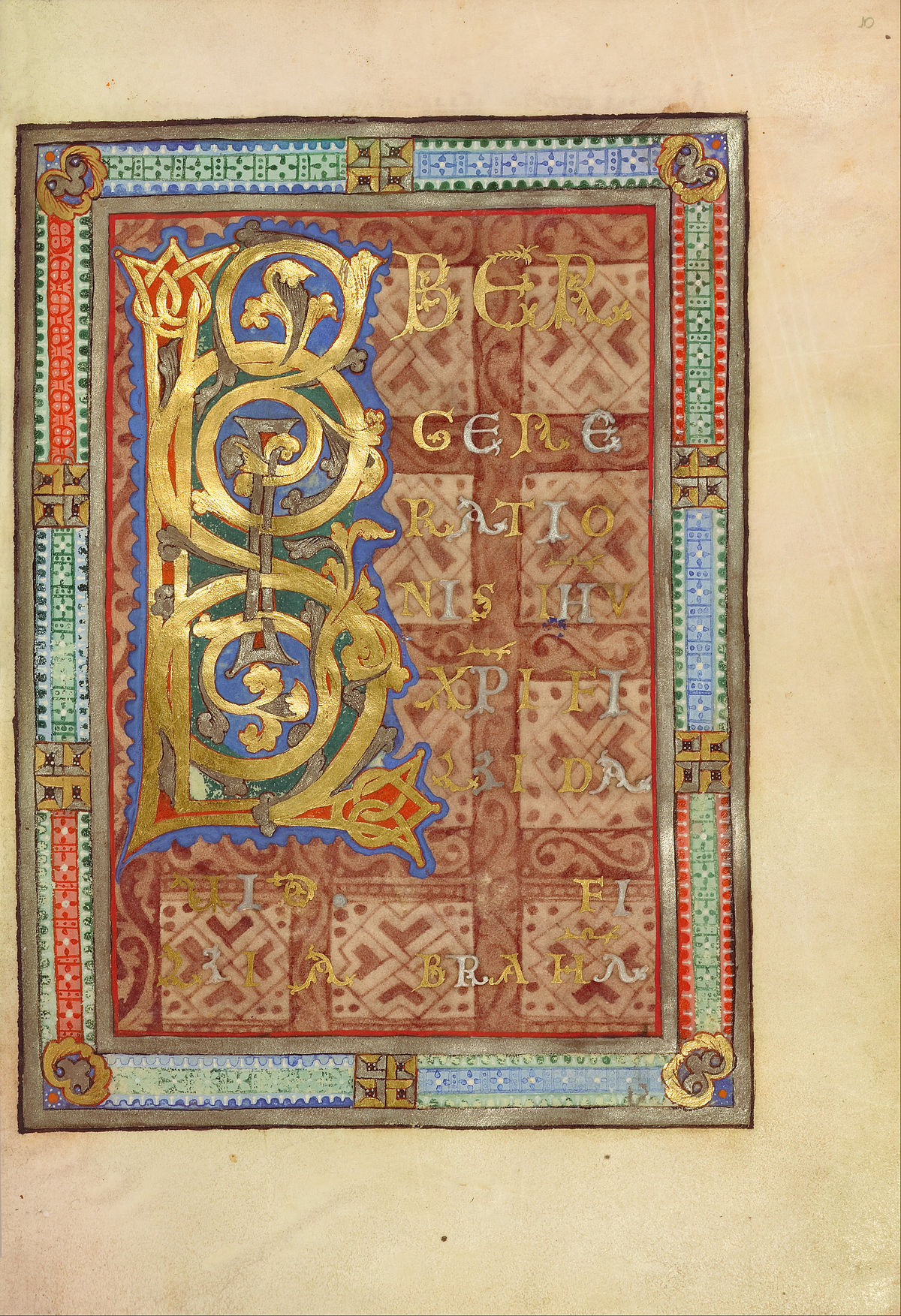Hello, and welcome to another Tinto Talks, the happy Sant Jordi San Jorge Saint George’s Day Castile and León Day Wednesday where we talk about our entirely super-top-secret game with the codename Project Caesar.
This week, we will be talking about a trending topic: What happens if two (or more) Popes are elected in a Papal Conclave? What makes a man goneutral join the Dark Side nail Ninety-five Theses against indulgences on a church in Wittenberg? How does a general council of the Catholic Church react to this?
Or, in other words, we will be talking today about three historical Situations present in our game: the Western Schism, the Reformation, and the Council of Trent.
When a Pope dies, some processes need to be started, leaning towards the most important one, the Papal Conclave, which will determine the election of a new Pope:


The Pope has died! As shown last week, the special Papal Heir Selection determines that a regency will start, with a clergyman becoming the Head of the Papal Conclave.
If it’s the year 1360 or later, a Schism might strike the Catholic Church, making for a divided election:

The Western Schism may be managed in this panel:

Where you might see a few things:
This is the starting point of the Vote Progress hoverable tooltip (in the panel above, you see the numbers after some months/years have passed):

The ‘Unity of Faith’ action:

And this is what happens because of the Curia Actions of the Catholic Church IO being blocked:

Finally, this is the situation map mode, showing the countries supporting each side:

The French candidate has more support than the current candidate, while Castile is sitting on the fence of the split election.
There will be some possible actions to gather support for each candidate, and some events may trigger randomly during the situation. And after a while, one of the candidates will gather enough support to reunite the Catholic Church again:

However, there are more perils for the Catholic Church…
After the year 1510, a certain Augustinian monk will protest against the uses of the Church, starting the Reformation:


The birthplace of the Reformation will be semi-dynamic, there are some weights in place, so it will usually trigger in a different place of the Catholic Christendom. In this case, Martin Luther was serving his duty in Perugia, Italy.

The doctrine that a proper Catholic should follow!
This is the starting panel of the situation:

The elements that you can see are:

This might be a situation a year or so after the Reformation starts:

Ignore the weird graphical bug that we just found while writing this TT, each character has its own different portrait.

A second reformer, Zwingli, appeared in Switzerland, making the Free City of Bern a Lutheran bastion, and also 7 Lutheran Preachers buildings appeared. In the map mode, you can see the countries already converted to Lutheranism, the locations that already have Lutheran pops, and also other Protestant confessions present, such as some Hussites in Bohemia. Ignore the red borders, BTW; some countries decided that the start of the Reformation was a good moment to declare war on me, the Papal States, while preparing the screenshots for this Tinto Talks (traitors and heretics, they are!).
The Reformation may last for a while, because these are its ending triggers:

Which leads us to the third and final Situation for today:
If the Reformation is still active, and the Reform Desire (the modifier I mentioned in the Western Schism situation) is over 50%, the Council of Trent will trigger:



The main point of the Council of Trent is to debate, and eventually approve, some new Laws for the Catholic Church IO; When those Laws are voted and passed, it will end the Council:


And these are some examples of the Laws that are available for voting, each one having different policies that can be set:



Except for the Papal Authority doctrine, all the policies have proper Latin names, as they should be!
And that’s all for today! We hope that you enjoyed itand that your favourite cardinal becomes Pope. Next week, we will be taking a look at the final part of the Western Christian religious puzzle: the mechanics for the different Protestant confessions, and another situation, the War of Religion. And don’t forget that this Friday we will post the Tinto Flavour with the content for the Military Orders of the Teutonic & Livonian Orders and the Knights Hospitallers. Cheers!
This week, we will be talking about a trending topic: What happens if two (or more) Popes are elected in a Papal Conclave? What makes a man go
Or, in other words, we will be talking today about three historical Situations present in our game: the Western Schism, the Reformation, and the Council of Trent.
The Western Schism
When a Pope dies, some processes need to be started, leaning towards the most important one, the Papal Conclave, which will determine the election of a new Pope:


The Pope has died! As shown last week, the special Papal Heir Selection determines that a regency will start, with a clergyman becoming the Head of the Papal Conclave.
If it’s the year 1360 or later, a Schism might strike the Catholic Church, making for a divided election:

The Western Schism may be managed in this panel:

Where you might see a few things:
- The contenders - the Papal States (the Pope residing either in Avignon or in Rome) on one side, and the country backing the second Pope on the other.
- The support gathered by each Pope (which will slowly tick up, until one of them reaches 100% support).
- The Reform Desire (more on this later).
- The Curial countries that support each candidate.
- The available actions.
This is the starting point of the Vote Progress hoverable tooltip (in the panel above, you see the numbers after some months/years have passed):

The ‘Unity of Faith’ action:

And this is what happens because of the Curia Actions of the Catholic Church IO being blocked:

Finally, this is the situation map mode, showing the countries supporting each side:

The French candidate has more support than the current candidate, while Castile is sitting on the fence of the split election.
There will be some possible actions to gather support for each candidate, and some events may trigger randomly during the situation. And after a while, one of the candidates will gather enough support to reunite the Catholic Church again:

However, there are more perils for the Catholic Church…
The Reformation
After the year 1510, a certain Augustinian monk will protest against the uses of the Church, starting the Reformation:


The birthplace of the Reformation will be semi-dynamic, there are some weights in place, so it will usually trigger in a different place of the Catholic Christendom. In this case, Martin Luther was serving his duty in Perugia, Italy.

The doctrine that a proper Catholic should follow!
This is the starting panel of the situation:

The elements that you can see are:
- The Lutheran and Catholic pops at each moment.
- The main active reformers (since all of them are characters that may spawn by event).
- The Lutheran Preachers, which is a building that may spawn and spread throughout Catholic countries:

This might be a situation a year or so after the Reformation starts:

Ignore the weird graphical bug that we just found while writing this TT, each character has its own different portrait.

A second reformer, Zwingli, appeared in Switzerland, making the Free City of Bern a Lutheran bastion, and also 7 Lutheran Preachers buildings appeared. In the map mode, you can see the countries already converted to Lutheranism, the locations that already have Lutheran pops, and also other Protestant confessions present, such as some Hussites in Bohemia. Ignore the red borders, BTW; some countries decided that the start of the Reformation was a good moment to declare war on me, the Papal States, while preparing the screenshots for this Tinto Talks (traitors and heretics, they are!).
The Reformation may last for a while, because these are its ending triggers:

Which leads us to the third and final Situation for today:
The Council of Trent
If the Reformation is still active, and the Reform Desire (the modifier I mentioned in the Western Schism situation) is over 50%, the Council of Trent will trigger:



The main point of the Council of Trent is to debate, and eventually approve, some new Laws for the Catholic Church IO; When those Laws are voted and passed, it will end the Council:


And these are some examples of the Laws that are available for voting, each one having different policies that can be set:



Except for the Papal Authority doctrine, all the policies have proper Latin names, as they should be!
And that’s all for today! We hope that you enjoyed it





